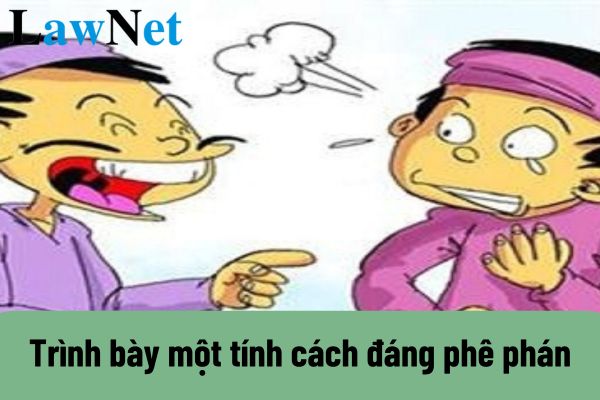Vietnam: What is the sample presentation on the criticized character trait of bragging? What are the elective subjects of 8th-grade students?
What is the sample presentation on the criticized character trait of bragging?
The character trait of bragging is often criticized by society. Individuals with this trait tend to exaggerate the truth and boast about themselves, their possessions, or their achievements. They tend to elevate themselves, impressing others with eloquent, sometimes even untrue, statements.
Presentation on the criticized character trait of bragging is practiced by students in the 8th-grade Literature curriculum.
Students may refer to the following sample presentation on the criticized character trait of bragging:
|
Sample presentation on the criticized character trait of bragging
|
*Note: The above sample presentation on the criticized character trait of bragging is for illustrative purposes only./.

What is the sample presentation on the criticized character trait of bragging? What are the elective subjects of 8th-grade students in Vietnam? (Image from the Internet)
What are the elective subjects of 8th-grade students in Vietnam?
According to Section 1, Part 4 of the General Education Program issued along with Circular 32/2018/TT-BGDDT:
Basic Education Phase
...
1.2. Lower secondary level
a) Educational Content
Compulsory subjects and educational activities: Vietnamese Language; Mathematics; Foreign Language 1; Civic Education; History and Geography; Natural Sciences; Technology; Informatics; Physical Education; Arts (Music, Fine Arts); Experiential Activities, Career Orientation; Local Educational Content.
Elective subjects: Ethnic Minority Language, Foreign Language 2.
b) Education Duration
Classes per day, not exceeding 5 lessons per session; each period is 45 minutes. Schools meeting the conditions are encouraged to implement full-day schooling as per the guidance of the Ministry of Education and Training.
...
The elective subjects of 8th-grade students (13-year-old students) include 02 subjects: Ethnic Minority Language and Foreign Language 2.
What learning outcomes are required for the writing process in the 8th-grade Literature curriculum in Vietnam?
Under the general education program issued along with Circular 32/2018/TT-BGDDT, the learning outcomes required for the writing process in the 8th-grade Literature curriculum in Vietnam include:
- Preparating before writing (identifying the topic, purpose, audience, form, collecting information, materials);
- Brainstorming and outlining; writing; reviewing and editing, learning from experience.

